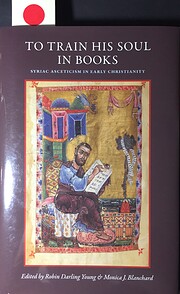

Cliquer sur une vignette pour aller sur Google Books.
|
Chargement... To Train His Soul in Books: Syriac Asceticism in Early Christianity (Studies In Early Christianity)par Robin Darling Young
Aucun Actuellement, il n'y a pas de discussions au sujet de ce livre. Aucune critique aucune critique | ajouter une critique
Flourishing from the inland cities of Syria down through the Tigris and Euphrates valley, Syriac speakers in late antiquity created a new and often brilliant expression of Christian culture. Although the origins of their traditions are notoriously difficult to trace, authors of fourth-century Syrian communities achieved sophisticated forms of expression whose content little resembles the Christian culture of their neighbours to the west. From the fourth through the seventh centuries they achieved religious works of great beauty and complexity. Increasing interest in Syriac Christianity has prompted recent translations and studies. To Train His Soul in Books explores numerous aspects of this rich religious culture, extending previous lines of scholarly investigation and demonstrating the activity of Syriac-speaking scribes and translators busy assembling books for the training of biblical interpreters, ascetics, and learned clergy. Befitting an intensely literary culture, it begins with the development of Syriac poetry--the genre beloved by Ephrem and other, anonymous authors. It considers the long tradition of Aramaic and Syriac words for the chronic condition of sin, and explores the dimensions of the immense work of Syriac translators with a study of the Syriac life of Athanasius. Essays consider the activity of learned ascetics, with a proposal of the likely monastic origin of the Apocalypse of Daniel; the goal and concept of renunciation; and the changes rung by Syriac-speaking ascetics on the daily reality of housekeeping. Also included in the volume are two essays on the influence of Syriac literary culture on Greek traditions, and in turn ascetic life. Finally, an original poem in Syriac demonstrates the continuing vitality of this culture, both in its homeland and in the Diaspora. These essays seek to extend and honour the work of renowned scholar and pillar of the Department of Semitic and Egyptian Languages at the Catholic University of America, Sidney H. Griffith. Aucune description trouvée dans une bibliothèque |
Discussion en coursAucun
 Google Books — Chargement... Google Books — Chargement...GenresClassification décimale de Melvil (CDD)248.4Religions Christian Devotional Literature and Practical Theology Christian Life; experience and practice Christian LivingClassification de la Bibliothèque du CongrèsÉvaluationMoyenne: Pas d'évaluation.Est-ce vous ?Devenez un(e) auteur LibraryThing. |
||||||||||||||||||||||||||||||||||||||||||||||||||||||||||||||||||||||||||||||||||||||||||||||||||||